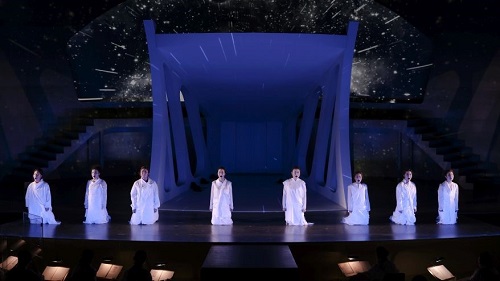 Austria Ong Keng Sen, Bae Sam-sik, Ahn Sook-sun, Jung Jae-il: Trojan Women. Soloists and chorus of the National Theater of Korea / National Changgeuk Company of Korea. Guest performance of the Wiener Festwochen at the Theater an der Wien, Vienna. 18.6.2018. (SS)
Austria Ong Keng Sen, Bae Sam-sik, Ahn Sook-sun, Jung Jae-il: Trojan Women. Soloists and chorus of the National Theater of Korea / National Changgeuk Company of Korea. Guest performance of the Wiener Festwochen at the Theater an der Wien, Vienna. 18.6.2018. (SS)

‘The search for music and music theater is quickly over’, wrote Der Standard’s chief music critic last weekend in an arch recap of this year’s events at the Wiener Festwochen. Yet to extend the ‘search for music theater’ to the National Theater of Korea’s Trojan Women, which brought the Festwochen to a close on Monday, requires no charity, no special pleading. It is music theater through and through; an operatic spectacle with a cast of formidable divas.
The libretto, an original adaptation of Euripedes’ tragedy by the Korean playwright Bae Sim-sik, is dominated by intricate monologues set to original pansori composed orally by the officially designated ‘national living treasure’ Ahn Sook-sun. Traditionally, pansori songs were performed by a single vocalist to the beat of a barrel drum, but as they came to define changgeuk, a twentieth century form of music theater identified as opera in the West (and associated in Korea itself with the influence of Italian and German opera), they were sung by a full cast of singers in different roles.
The monologues sung in Trojan Women by Hecuba of Troy, her daughter Cassandra, and her daughter-in-law Andromache (each woman paired with specific traditional instrument combinations) therefore came together as an epic changgeuk, with the long laments building up into entire scenes, during which voice, music, drama and emotion subtly converged. Many phrases culminated in a held note which underwent a series of striking inflections, deepening the emotional pull of the words and the stories they told. Irregular rhythmic patterning appeared to give the text not only the cadence of natural speech (words were never garbled, as can happen in operatic recitative) but also a spellbinding narrative dynamism. Kim Kum-mi’s sensational performance as Hecuba left the impression that her hardened character had nothing left but her body and her words, with no intention of relinquishing either.
Helen, the much-maligned cause of the Trojan War but also one of its victims, is handled differently. Her pansori was accompanied by an Elton John-style piano ballad played with crazed embellishments on a tinny digital keyboard. Her womanhood was queered too, in that she was played by a beautiful man in stunning drag and glitter-adorned cheekbones, whose entrance landed the production its biggest coup de théâtre. Kim Jun-soo played the plaintive, more sensitive Homeric version of Helen to poised perfection, even if the character’s graceful comportment failed to rouse much sympathy from the other women.
The other departures from changgeuk are the K-pop chorus numbers written by Jung Jae-il, and Ong Keng Sen’s abstract staging, which situates the women around a sleek white structure that looks as if it could have been designed by the late Zaha Hadid. Video projections by Austin Switser cycle through the four elements (water, fire, air, earth), which flood the set and the cast’s white robes. The Greek herald Talthybius (Lee Kwang-bok) enters via the auditorium, and blinding lights to implicate the audience with the Greeks shone every time, causing mild exasperation among some audience members and indifference among the rest. Following the letter of certain Brechtian effects (writes a staunch devotee of Regietheater) is not very Brechtian. My companion also likened the grotesquely loud amplification to a blockbuster Broadway musical, which was not an unfair comparison. Pansori singers traditionally trained their voices under waterfalls, in order to strengthen the vocal cords and explore expressive limits, and so this is not a genre for those unable to sing out. With no weak voice among the cast, it would have been welcome to hear their powerful laments without an electronic filter.
‘We die and yet we don’t die’, howls Hecuba, summing up an existence for which the past is pain and the future is cancelled. The nihilism was stark in this changgeuk Trojan Women, and yet the human fortitude inherent in the sheer rawness of the cast’s vocal expression signaled something else. Some stories refuse to be erased, and as in the pansori tradition, these women will continue telling them with every fiber of their being.
Sebastian Smallshaw